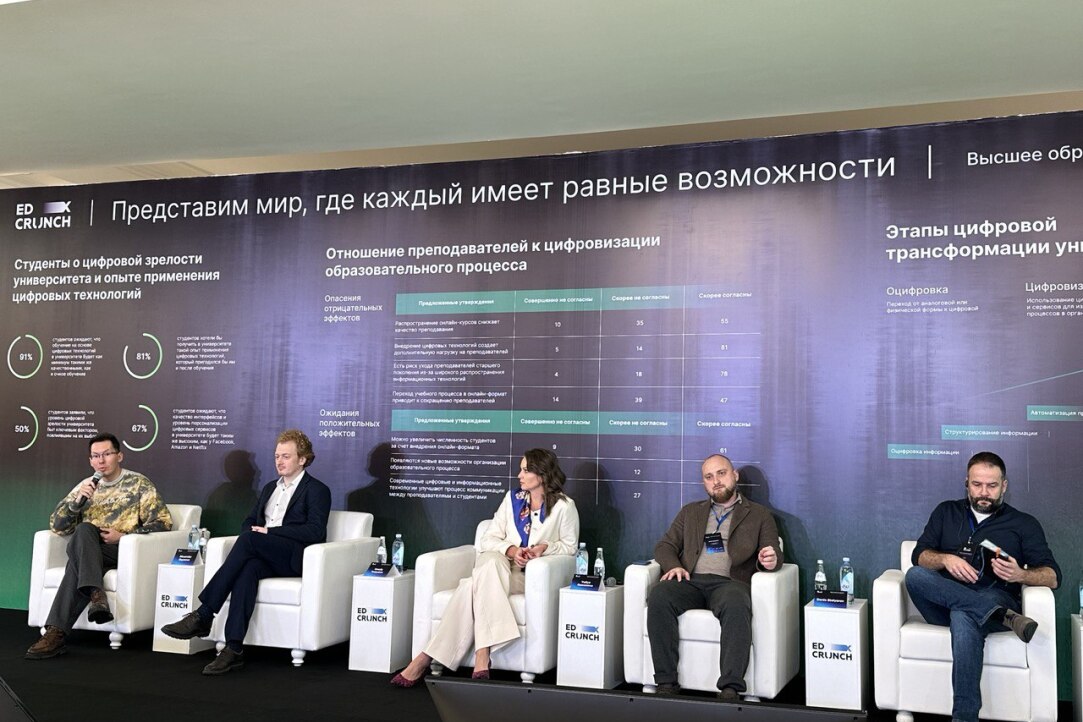HSE University at EdCrunch X: Online Campus Transforms Students’ and Teachers’ Perceptions

HSE University’s online campus took part in EdCrunch X, the anniversary global conference on digital technologies in education, in November. The event, under the slogan ‘Imagine a world where everyone has equal opportunities,’ brought together more than 3,000 in-person participants in Almaty, Kazakhstan, and more than 10,000 online listeners from 25 countries.
The tenth EdCrunch featured seven thematic tracks and 150 events at which 350 global speakers covered the creation of new technologies, approaches, and tools to provide users of all ages with access to quality education. The conference cases were as practically oriented as possible, seeking answers to questions about how to remain a happy teacher and enjoy work, how to develop media literacy among teachers and students, how to build effective inclusion in education, etc. The conference speakers discussed what needs to change for independent microdegree providers to become part of university education and what related disciplines need to be included in lessons to develop students’ understanding of the world and prepare for future careers that require a combination of skills from different professions.
HSE University Online took part in the panel discussion ‘From Digital Solutions to Data-Based University Management: Who Will Benefit from the Digital transformation of Universities.’ Alexander Baizarov, Director of Project Management at VTB Education (VTB Bank) and Head of the Hybrid Learning Project at the Graduate School of Management in St Petersburg, moderated the discussion. The speakers were Yulia Remezova, Director of Online Learning at HSE University; Chris Stable, Deputy Director for Research, Training and Counselling at the Risbo Centre (Erasmus University Rotterdam); Todd Nicolet, Vice-Rector for Digital and Lifelong Learning at the University of North Carolina at Chapel Hill; Denis Stolyarov, Vice-Rector for Student Affairs at Skoltech; and Vasily Tretyakov, Advisor to the Rector of ANO University 2035. The experts discussed why universities introduce digital technologies, immersed themselves in the virtual world of the digital campus, and learned about the new opportunities available to students, teachers, and external stakeholders.

‘The introduction of technology is uneven due to limited resources, budgets, and the conservatism of the academic environment. While HSE University is already implementing full-time higher education within the framework of an independent online campus, some universities are only automating their processes. Nevertheless, integration into the digital world is one of the main laws of survival for higher education providers.’
Commenting on the conference slogan, Chris Stable noted that equal access to education is not enough. The representative of Erasmus University Rotterdam sees the main goal of new technologies as increasing student engagement in the learning process. At the new stage of digitalisation, schools and universities have moved from building communication with machines that automate the routine work of teachers to personalities—it is important to observe what is happening in classes and auditoriums, how active and interested in knowledge the participants in the educational process are, and how they are helped by technologies. Denis Stolyarov emphasised the importance of adapting academic content to the online environment—simply broadcasting a professor’s lecture against the background of slides is no longer enough; completely different requirements exist for online formats.
Yulia Remezova added that ‘HSE University Online pays special attention to the personalisation of learning. Today, almost 3,000 students study in 21 undergraduate and graduate programmes at HSE University’s online campus. Having visited its prototype in the metaverse, users will be able to try out the university’s electronic library, the content of HSE University’s online products, and learn about proctoring, online exams, and studying in a digital format. The online campus is one of the largest university cases that transforms users’ and teachers’ perceptions.’
Using the example of University 2035, Vasily Tretyakov spoke about how to build a university without faculty, content, classrooms, or walls—a university based only on data about users’ professional activities, development, and interests. In his opinion, if digitalisation changes the way we teach and allows us to reach new students, then digital transformation forces universities to rethink what they are, understand what their mission is, and explore the new digital world.
See also:
HSE University Receives Highest Grant under Priority 2030 Programme
HSE University has proved its leading position in the first group of the ‘Research Leadership’ field under the Priority 2030 programme. The university has also received the highest grant for teaching digital competencies to students, demonstrating its educational leadership in the fields of digital technologies and AI.
‘In a Digital Environment, the Role of Human Teachers Only Becomes More Important’
How does digital technology affect the behavior and health of schoolchildren? What opportunities does it proved teachers and school administrators? These and other issues were discussed by participants in the plenary session ‘Children’s Wellbeing in the Digital Age’ at the XX April International Scientific Conference of HSE.
'If No More Problems Exist at Your Job, You Can Just Retire'
As Russia’s digital economy gains momentum, participants of the sporadic market of digital services need to pave a path for success using their experience, professional instincts, and basic knowledge. In the latest edition of Success Builder, CreativePeople Director Sergei Prokofiev discusses what it’s like to build a business alongside other HSE alumni, how to protect designers and monetise creativity, and what one should learn in order to find a job in the digital sphere.


